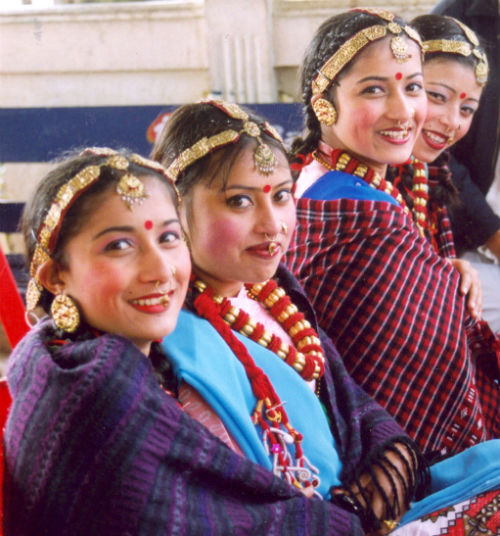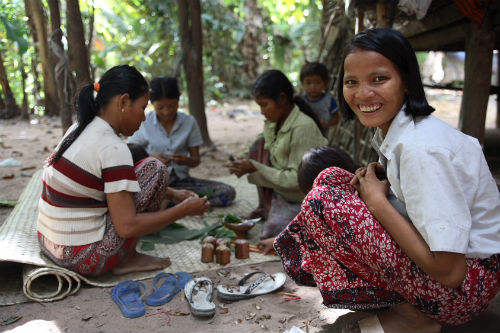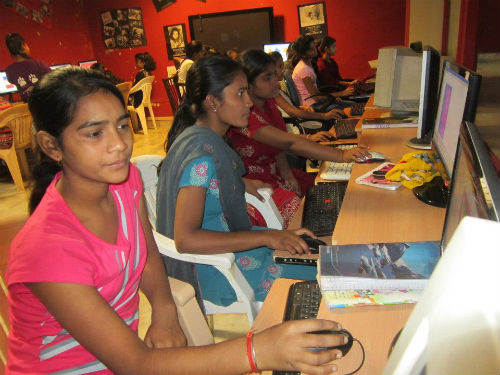
This post is part of the Global Mom Relay. Every time you share this blog, $5 will go to women and girls around the world. Scroll to the bottom to find out more.

I first met Dr. Musimbi Kanyoro last September during that inspiring week each year when the UN General Assembly meets and global health leaders and advocates from governments, civil society and the private sector convene throughout New York City. When Musimbi and I were introduced, I was impressed by her wisdom and passion for her work as President and CEO of the Global Fund for Women. The organization's mission is to "advance the rights of women and girls worldwide by increasing the resources for and investing in women-led organizations and women's collective leadership for change."
Last week, Musimbi graciously agreed to an interview as part of the Global Mom Relay to help empower girls and women around the world.

Musimbi, is there a universal piece of advice you would give to a young mother today, regardless of where she lives in the world?
Yes, I would tell the young mother that children grow very quickly and I would encourage her take time to be with them. Time with children enhances joy to the mother and the child.
In this two-week segment of the Global Mom Relay, the beneficiary is the Mobile Alliance for Maternal Action (MAMA). Would you share other examples of how technology is helping address the most pressing global health issues?
Technology has always been part of the Global Fund for Women grantmaking but what we fund today is different. We fund skills, access to hardware, social media, computer trainings and use of technology for advocacy.
GFW's early grants were to resource centers, to radio shows, or to feminist newsletters, publications, and spaces where women could go to access information that they could not get in any other way. But accessing information is not about pamphlets and newsletters anymore. Information is power and women still need access to it, and more importantly they need to be creators of it. The digital divide is real. We will support women's access to technology and creation of information in its 21st century form. One of our current grantees, Rainbow Rights, based in Manila, creates podcasts about women's health and sexuality. To their surprise, they've discovered that some of the most frequent consumers of their podcasts are Filipino migrant workers in Qatar and Saudi Arabia and other Middle Eastern countries. These workers can only find information and support in their native Tagalog through the internet.
An organization that is a grantee of the Global Fund, called Feminist Approach to Technology (FAT) was created in New Delhi, India in 2007, to "create a movement, a change in the definition of the relationship between technology and women." FAT's programming ranges from basic, confidence and skills-building courses with young women aged 12-18. The group's multi-pronged strategy, reaching grassroots girls, corporate executives and other women's groups, seeks to address the needs of women at various stages of technological capacity and create a web of influence and support through and for technological savvy. Additionally, FAT's work offers both a gendered critique of the current structure of technology and imagines alternative structures that mobilize the emancipatory potential of technology for advocacy and action.
In my own country, Kenya, and many other parts of Africa, mobile device technology is changing the social and economic development landscape. Mobile phones are powering revolutions in banking, in education, in healthcare, in the very way families and communities relate to each other. Tablets and laptops will unleash their own disruptions as they propagate beyond the city center, following the mobile phone into everyone's lives.
But before we are blinded by the hype, we need to ground ourselves in reality. There is still a digital divide in technology infrastructure. Not everyone has access to mobile phones, even less to tablets, and fewer to computers and the Internet. Also, the technologies we use today work well, but they could be so much better if they were also designed for the needs of rural communities far away from electric and other conveniences.
This year GFW is celebrating its 25th anniversary. Congratulations! Please share your perspective on the significance of this milestone.
At the milestone of 25 years, we have reached more than a billion women, been able to work with over 4,600 groups in 174 countries, affecting the lives of women - addressing violence and cruelty and creating opportunities for girls to go to school. Global Fund for Women has been a game-changer, a bridge builder, and a force for constantly widening the circle of the movement for women's rights. We have consistently worked to bring new voices into women's movements, to start new conversations, sometimes on hard issues, and to push the philanthropic envelope to put women and girls' human rights on the agenda.
Raising awareness about sexual health is another big achievement for the Global Fund for Women and its grantee partners. Johnson & Johnson's sustained support for this and our broader work has helped us to raise funds from other organizations, as well.
We are very excited that Secretary Hillary Clinton is giving the keynote address for our 25th anniversary celebration. Whether as First Lady or Secretary of State, Hillary Clinton placed women and girls at the top of her policy agenda. She is someone I tremendously respect and admire and I am excited that she accepted my invitation
What is the best of advice you received from your mother or grandmother?
I am named after my grandmother. My mother was the caretaker for all of us, but my grandmother was "the salt in the food." She would always tell us, "There is no limit to where you can go." My grandmother was a very courageous woman who broke some taboos in her own time and she encouraged us to be bold.
After our phone interview I smiled, thinking about how proud Musimbi's grandmother would be to see how her bold and courageous granddaughter had heeded her advice. Musimbi has seen no limits for herself or for the millions of girls and women she has helped in her years as an advocate for their rights.

Photos coutersy of The Global Fund
Each time you share this Global Mom Relay piece on Facebook, Twitter, or Email, or donate $5 or more through clicking on the above graphic, a $5 donation (up to $500,000) will be donated by Johnson & Johnson and the Bill & Melinda Gates Foundation to the Mobile Alliance for Maternal Health(MAMA). $5 provides a mother six months of mobile health messages to guide her throughout pregnancy and baby's first year. Join us by sharing it forward and unlock the potential for women and children around the globe. For more information, visit www.unfoundation.org/globalmomrelay. The United Nations Foundation, Johnson & Johnson, BabyCenter, The Huffington Post, and the Bill & Melinda Gates Foundation created the Global Mom Relay, a first-of-its-kind virtual relay with a goal of improving the lives of women and children around the globe.